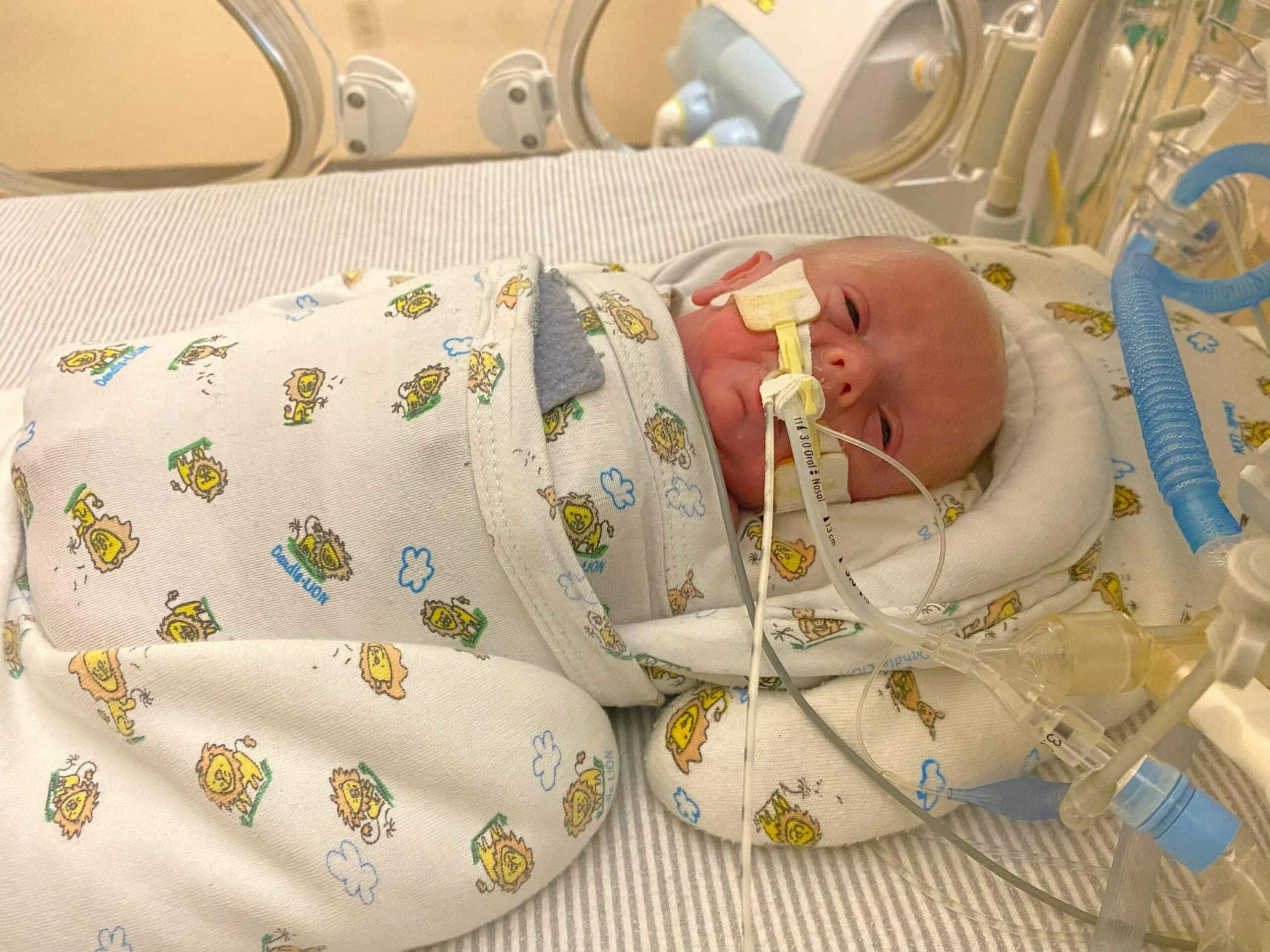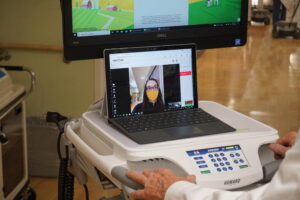View Larger Image

Ridley Becker was born Oct. 26 at 25 weeks, weighing 1 pound, 4 ounces. Thanks to e-Link, new mother Jaclyn Becker says she doesn't miss a beat with his care.
Image by Jaclyn Becker
UAMS e-Link Bridging the Gap Between Parents, NICU
| New mom Jaclyn Becker of Bryant said the experience of having her first child hasn’t been what she imagined.
Ridley Becker was born Oct. 26 at 25 weeks, weighing 1 pound, 4 ounces. He’s been in the neonatal intensive care unit (NICU) since that time.
“Being separated from him has been really hard,” she said. “Now that he’s born, you want your baby to be home with you, and we don’t really get to have that right now.”
Recently, however, the NICU has begun reaching parents using UAMS e-Link, a service of the Institute for Digital Health & Innovation. Using smartphone video, parents can speak directly to each member of their baby’s caregiving team as they make their daily rounds. It puts names and faces with caregivers that parents might not usually be able to see.
“Before COVID-19, we always encouraged families to be here when we round — we really like that,” said neonatologist Whit Hall, M.D. “The problem is that we cannot predict when we’re going to round, so what we’re trying to do with this technology is to allow the families to participate virtually and still go on with their lives.”
“With COVID going on, the bridge that the institute’s e-Link has provided between Dr. Hall’s team and the families is right on time and so needed,” said Alyssa Robinson, BSN-RN, nurse project manager for UAMS e-Link.
Virtual visits are easy: families receive a text, log in to the e-Link portal on their smartphone and have a live chat with the team taking care of their baby. It puts parents right in the middle of the huddle to ask questions and receive updates in real time.
The portal can be customized for Spanish-speaking families and allows interpreters to be invited into virtual visits, Robinson said.
Talking with her baby’s team directly through e-Link has helped a lot, Becker said. She feels she doesn’t miss a beat with Ridley’s care.
“This allows me to be really involved in case I have something else going on, and it allows me to ask questions,” she said. “It’s helpful because it’s not me asking later on for a summary of what they discussed — it’s me with them, in the conversation. And that’s why I really like it. It’s just really convenient for me.”
Rounds include a group of people from multiple specialties — pharmacy, nutrition, speech therapy, occupational therapy, as well as residents, fellows and attending physicians, Hall said. It’s the perfect time for parents to get information from each specialist. Families still receive regular updates on their baby if they miss rounds, but the live sessions are often more detailed.

Virtual visits are easy: families receive a text, log in to the e-Link portal on their smartphone and have a live chat with the team taking care of their baby.Benjamin Waldrum
“We want to invite families to round with us every day, that’s our goal,” Hall said.
“I’ve rounded with the team, and it is phenomenal to watch and hear,” Robinson said. “As a nurse, we always want to keep our families informed about their loved ones, and with the e-Link portal and Dr. Hall’s team, that goal is accomplished.”
The NICU has only been using the e-Link portal for a few months, Hall said, but it’s already made a big difference for parents.
“It’s not good for anybody to be in the hospital 24/7,” Hall said. “So this is a way for families to really bridge the gap and be here when we round.”
Hall has faced the same hardships they have — a grandchild was in the NICU for several months.
“When things were going well with my grandchild and my child, my whole world was fine,” he said. “When things were going poorly, there’s nothing you could do to cheer me up.”
Having the technology to help keep parents informed is a way to help give some comfort.
“One thing we can do is to keep them informed and let them know everything that is going on with their baby. These families have a really hard time with their baby in the NICU, and that’s the one thing that we can do that might make their life just a little bit easier.”
UAMS e-Link is a cloud-based, digital health platform enabling providers, community hospitals, clinics and patients to conduct virtual visits. It is one of the largest digital health networks in the country. In April, UAMS surpassed 100,000 digital health visits during the pandemic to reach patients from all corners of the state by expanding the network and range of quality health care, in addition to providing digital health services for rural health care facilities.
